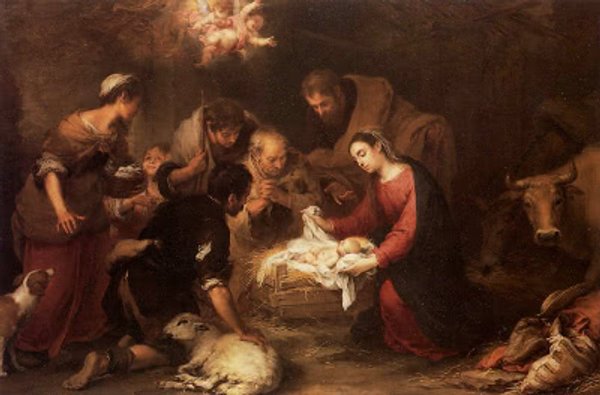Octavius Cesar Augustus has decreed that a census be taken of all the people living in the Roman Empire. The order affects everyone, from the richest to the poorest. In Palestine, the census must conform to Jewish practice, with each one going to his home town. Because Joseph was of the house and lineage of David, he went up from Galilee, from the city of Nazareth, to Judea, to the city of David, which is called Bethlehem, to be enrolled with Mary his bethrothed, who was with child (Lk 2:4-5).
Thus, with great naturalness, the evangelist begins his narration of the event that is going to change mankind's history. The journey was a long one: over 80 miles. It would take four days—if everything went well—in one of the caravans that traveled south from Galilee. Mary was not obliged to go, since the census was the duty of the head of the family. But how could Joseph leave Mary on her own when she is about to give birth? And above all, wouldn't Mary want to accompany Joseph to the city where—according to the Scriptures—the Messiah was to be born? Joseph and Mary discover in that strange caprice of the far-off Emperor God's hand guiding them in all their steps.
The King of Israel, the Desired of all the nations, the eternal Son of God, comes into the world in a place meant for animals.
Bethlehem was a small town. But the census means that there is much more activity than usual. Joseph and Mary go to the imperial officer to pay the tribute and to be enrolled in the book of the Emperor's subjects. Then Joseph looks for a place to spend the night. Tradition tells us that he went in vain from door to door. Finally, he goes to the “khan" or public inn where there would always be a corner free. It was nothing more than a walled-in patio. In the center was a cistern with water, around which the pack-animals were sheltered, and next to the wall there were some sheds for the travelers, covered with a primitive roof. Frequently these were divided by partitions so that each group could find at least a bit of privacy.
It was not a fitting place for our Lady to give birth. We can imagine Joseph's suffering as the hour for Mary's delivery drew near. There was no room for them in the inn (Lk 2:7), St. Luke remarks tersely. Someone, perhaps the owner of the inn, must have told them that on the outskirts of the town there were some caves used to house the animals on cold nights; perhaps they could stay there until the crowds dispersed and a room opened up in the town.
Divine Providence made use of these circumstances to show that the Son of God had decided to come into our world in poverty and humility. This was be an example to all those who would follow him down through the centuries. As St. Paul said: For you know the grace of our Lord Jesus Christ, that though he was rich, yet for your sake he became poor, so that by his poverty you might become rich (2 Cor 8:9). The King of Israel, the Desired of all the nations, the eternal Son of God, comes into the world in a place meant for animals. And his Mother has to offer him, as his first crib, a narrow manger.
The lowly ones of this earth, whose humble state obliges them to care for the flocks of others, are the first to receive the news of this great portent: the birth of the promised Messiah.
But the Almighty does not want this prodigious event to pass entirely unnoticed. There were shepherds out in the field, keeping watch over their flock by night (Lk 2:8). The lowly ones of this earth, whose humble state obliges them to care for the flocks of others, are the first to receive the news of this great portent: the birth of the promised Messiah.
An angel of the Lord appeared to them, and the glory of the Lord shone around them, and they were filled with fear. And the angel said to them: Be not afraid; for behold I bring you good news of great joy which will come for all the people " (Lk 2:9-10). After giving them this Good News, the angel also gives them the sign by which they would be able to recognize him: You will find a babe wrapped in swaddling cloths and lying in a manger ( Lk 2:12). And suddenly there was with the angel a multitude of the heavenly host praising God and saying Glory to God in the highest, and on earth peace among men with whom he is pleased ( Lk 2:14).
The shepherds make their way to the town. Perhaps they take some presents to offer the Mother and the new-born Child. Mary and Joseph see in their homage a proof that God is watching over his Son. They too are filled with joy on seeing the sincere joy of the shepherds, and they would have pondered in their hearts how God is pleased with those who are poor in spirit and humble.
The shepherds return to their flocks, praising God for all they had heard and seen (Lk 2:20). Two thousand years later, we too are invited to proclaim God's marvelous deeds. “A holy day has dawned upon us. Come, you nations, and adore the Lord. For today a great light has come upon the earth" (Third Mass of Christmas, Gospel acclamation).
J.A. Loarte

